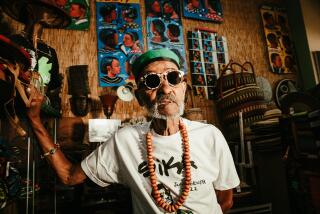Leimert Park’s Kwanzaa celebration gets off to a pounding start
- Share via
“Habarigani,” came the call from Leon Mobley, the globe-trotting djembe drummer.
“Umoja,” was the reply from the collection of local percussionists who had joined him in a spontaneous session of West African drum rhythms.
Mobley, who was recently on tour, returned to his old Leimert Park stomping ground Sunday to launch Kwanzaa, the seven-day African American celebration of family, community and culture.
His message was unity through drums.
“What does ‘Umoja’ mean?” he asked.
“Unity,” the crowd answered.
“Say the same thing 20 times,” he said. “We’re all here together in unity.”
For Mobley, the protégé of legendary Nigerian drummer Babatunde Olatunji, unity is the natural product of drumming.
“My teacher told me there should be a drum in every house,” Mobley said. “That is something we all have in unity. I brought all my drums. They are my drums from my house. I brought them to share them with you.”
Mobley then led the group into the new Barbara Morrison Performing Arts Center, where he gave away a number of his drums in a raffle. Everyone who donated food to be given to a food bank received a raffle ticket.
The Kwanzaa celebration began with a boisterous parade down Crenshaw Boulevard featuring growling motorcycles, wildly circling go-carts, a club of mostly middle-aged bicyclists on tricked-out mounts and, of course, dueling drum squads accompanied by hypnotically gyrating drill teams.
Arriving at the park, where artisans were displaying crafts, clothing and foods, the Black Diamonds squared off with the Westside Destroyers and the Johnny High-Steppers for an hour of unrelenting drumming — marching style, rather than West African — before dispersing into the crowd.
The Los Angeles-area marching groups, which are not affiliated with any school, develop drummers from a young age to instill camaraderie and community values, along with just plain fun.
Lemar Edwards, 21, the Black Diamonds’ tenor drummer, is a graduate of Washington Prep High School in Los Angeles. He said he’s been drumming since he was 3.
“I just love to go to parades, and I love drumming,” he said.
Kwanzaa, celebrated from Dec. 26 through Jan. 1, is based on the African harvest tradition. The name is derived from the Swahili “matunda ya kwanza,” which means “first fruits.”
According to the official Kwanzaa website, the celebration was created in 1966 by Maulana Karenga, professor of Africana Studies at Cal State Long Beach, to reaffirm and restore African Americans’ connection to African culture.
At the opening of Sunday’s ceremony, three women in elaborate African costumes spoke of the bonds between Africa and the African American.
One, bearing a palm scepter in the role of the legendary Queen Califa, spoke of an African society said to have inhabited California’s coastal islands long before Europeans reached them — “an island nation of strong black female seafarers,” in her words.
“Never forget that the great state of California is named for an African queen, me, Queen Califa,” she said.
More to Read
Sign up for Essential California
The most important California stories and recommendations in your inbox every morning.
You may occasionally receive promotional content from the Los Angeles Times.













